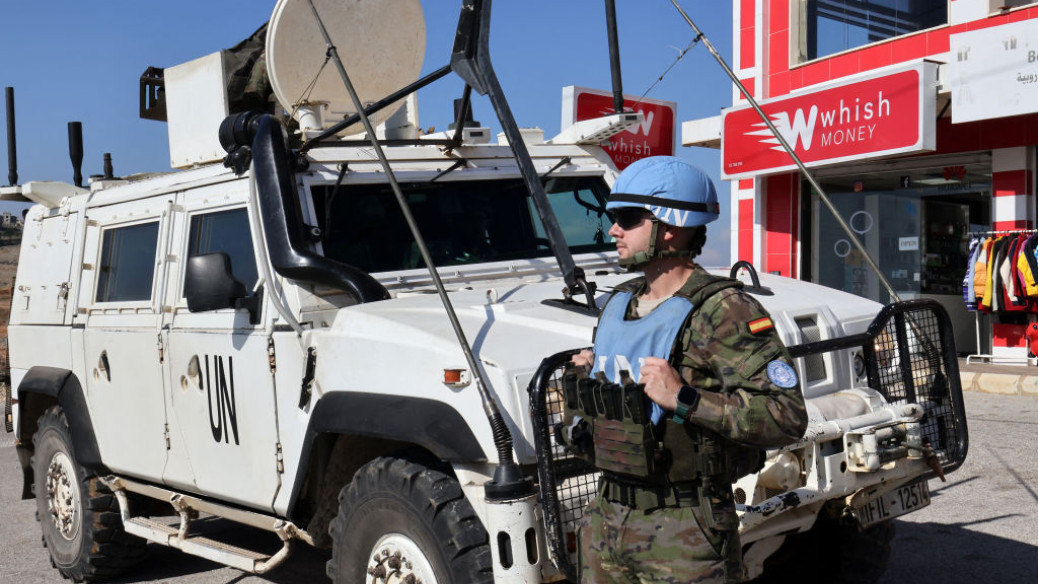Israel backs US bid to remove UNIFIL peacekeepers from Lebanon

Lebanese officials are urging France to back UNIFIL as Israel and the Trump administration reportedly agree on ending its 47-year mission in southern Lebanon.
A member of the Spanish UNIFIL peacekeepers forces in the southern Lebanese village of Marjayoun on 7 January, 2025. [Getty]
Israel is reportedly backing a move by the United States to end the 47-year presence of UN peacekeepers in southern Lebanon, stoking concerns in Beirut amid increasing Israeli airstrikes across the country.
White House documents show that President Donald Trump administration's is considering cutting all funding for UN peacekeeping missions around the world – including UNIFIL in Lebanon – as part of its radical agenda to slash government spending.
Right-wing Israeli newspaper Israel Hayom reported Sunday that Israel is supporting the removal of UNIFIL from the country, believing that the Lebanese army will be a more effective partner in eliminating Hezbollah's presence near the border.
UNIFIL was established after Israel first invaded Lebanon in 1978, and for the past four decades has served as the key deconfliction mechanism between Hezbollah and Israel.
There are currently 10,000 peacekeepers from almost 50 countries stationed between the Litani River and the Lebanon-Israel border.
UNIFIL's mandate is renewed annually by the UN Security Council in a vote in August. Washington could prevent the force from operating by vetoing the resolution when it is voted on in less than three months' time.
Israel has behaved with increasing belligerence against UNIFIL and repeatedly targeted their positions during its invasion of Lebanon last year.
The Israeli military last month fired on a UNIFIL base for the first time since the ceasefire between Hezbollah and Israel came into effect in November.
UNIFIL's future is being thrown into doubt at a time of rising anxiety in Beirut about increasing Israeli airstrikes across Lebanon.
The Lebanese army condemned the Israeli military's bombing of Beirut's southern suburbs last week and threatened to suspend cooperation with the international committee supervising the ceasefire between Hezbollah and Israel.
Israel has bombed Lebanon hundreds of times since it agreed to a ceasefire with Hezbollah in November.
Lebanese officials are reportedly pressing France to push to keep UNIFIL on the ground.
Sources told Al Araby Al Jadeed - the Arabic-language sister website of The New Arab – that France is trying to persuade the Trump administration to leave the peacekeeping force in place.
The US has not reached a final decision about whether to pull support, sources say.
"The Americans will send a military delegation to conduct an assessment and accordingly they will make a decision, but there is no information yet about when they will arrive," they told the news site.
"We continue to perform our duties, and we comply with the mandate of the Security Council in accordance with its resolution and at the request of the Lebanese government," UNIFIL sources told Al Araby Al Jadeed.
A low-level conflict began in Lebanon on 8 October 2023 when Hezbollah began launching rockets, drones and missiles across the border after the surprise Hamas attack on Israel.
The violence sharply escalated in September 2024 when Israel launched a heavy bombing campaign focused mainly on Lebanon's Shia-majority areas, assassinating many of Hezbollah's most senior leaders and invading the south of the country.
More than 4,000 Lebanese were killed and around 17,000 others injured in Israeli attacks, while over 1 million civilians were displaced by the violence.
Since the ceasefire came into effect, the Lebanese army has gradually deployed its forces south of the Litani and taken control of most areas occupied by Hezbollah.
Israel has withdrawn most of its troops from the country but is continuing to occupy several strategic locations close to the border.